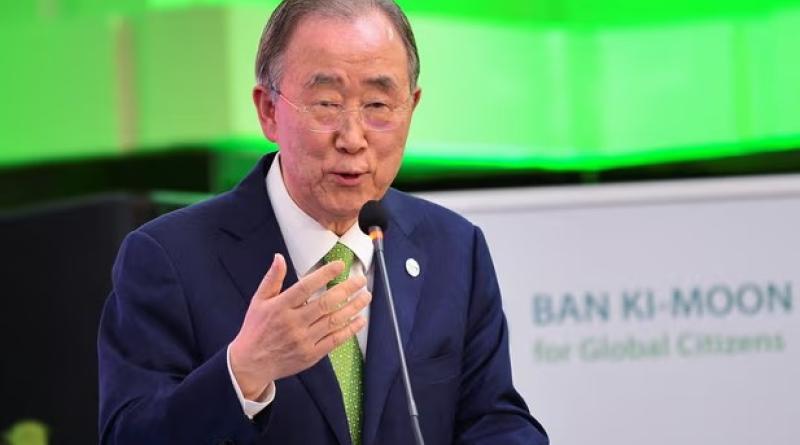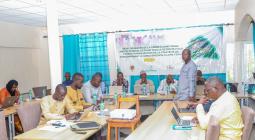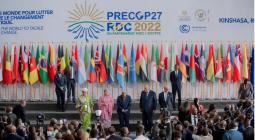Climate adaptation finance to Africa must increase tenfold, research shows

Countries forced to choose between climate resilience, fighting poverty and paying debts, says Ban Ki-moon
The flow of climate adaptation finance to Africa must increase up to tenfold by 2035 to meet the deepening effects of the climate crisis, according to research.
As the Africa Climate Summit continued in Nairobi, campaigners spoke of the desperate need to get funding to people who are already being affected by climate change. Africa, the region most impacted by the climate emergency, receives only 3% of global climate finance.
A Kenyan farmer, Phoebe Mwangangi, told attendees that changes in rainfall patterns in her south-eastern Makueni home town nearly 10 years ago meant that back then she had to walk for hours every day to find water for her livestock, disrupting her and her children’s lives. Yields were low and her cattle had grown weak, leaving her struggling to make ends meet.
“Farming and livestock is our livelihood, so we cannot do without it,” said Mwangangi.
Without investment of roughly £80m a year until 2035, the continent could lose out on as much as £4.8tn of economic benefits within the next decade, according to research by the Global Center on Adaptation (GCA).
“No country should be forced to choose between eradicating poverty, building climate resilience and honouring its debts, but right now that is what is happening,” said the former UN secretary general Ban Ki-moon, now chair of the GCA.
The organisation’s findings suggest that earlier estimates of Africa’s nationally determined contributions (NDCs) towards climate resilience, which placed the required funding at half that, were a “vast underestimate … prepared at a time when climate impacts were not projected to occur as quickly or as strongly as they are”.
Africa is witnessing climate extremes. In recent years, southern African countries such as Mozambique, Malawi and Zimbabwe have been hit by deadly cyclones, western African nations such as Nigeria have endured devastating floods and the horn of Africa has grappled with a prolonged drought that has left millions facing food insecurity. All these extreme weather events, experts say, have been made several times more likely by climate change.
The Kenyan president, William Ruto, has been seeking to move on from discussions of historical responsibility for carbon emissions, which, he said, “have become toxic” and led to a deadlock between developed and developing countries. With pledged climate funding from western countries, including the 2009 commitment to direct $100bn (£80bn) in annual climate finance, not forthcoming, he said African countries needed to explore other avenues.
“Let me be clear. These conversations are necessary,” Ruto said earlier this week. “Africa’s carbon footprint remains small … and a complex interplay of needs and responsibilities is a daily challenge but it should not lead to a deadlock. We must be alert to the fact that they can sometimes blind us to the bigger picture.”
Activists say sidestepping discussions on western accountability for the climate crisis can be harmful. “It erases the experiences of those who are suffering right now … and allows business to continue as usual,” said Vanessa Nakate, a Ugandan climate campaigner.
Ruto and other African leaders are looking to “business” solutions to the climate crisis, calling for global carbon taxes and financial reform to free up additional climate funding, and pushing for debt relief for African countries, a number of which are struggling to balance development needs such as education and health against climate action.
Campaigners have expressed reservations about the pivot by African countries into courting private financing, but acknowledge that the need for additional climate funding is dire.
“For communities who are suffering from the worst impacts of climate change, it goes beyond the droughts or the floods they experience,” said Nakate. “Failed harvests could mean increases in child marriages, children dropping out of school, it could exacerbate poverty – it creates more problems that are passed on from generation to generation.”
Agricultural organisations are also searching for alternative methods. Aiccra and the International Livestock Research Institute, which promote techniques such as the use of drought-tolerant crop varieties and water harvesting, have been training Mwangangi and a group of two dozen other female farmers in the practices, which she says have boosted their agricultural productivity and helped them navigate harsh weather impacts.
“This kind of information can change the lives of farmers,” Mwangangi said.
Photograph: John Muchucha/Reuters - Ban Ki-moon, chair of the Global Center on Adaptation, at the Africa Climate Summit in Nairobi.





